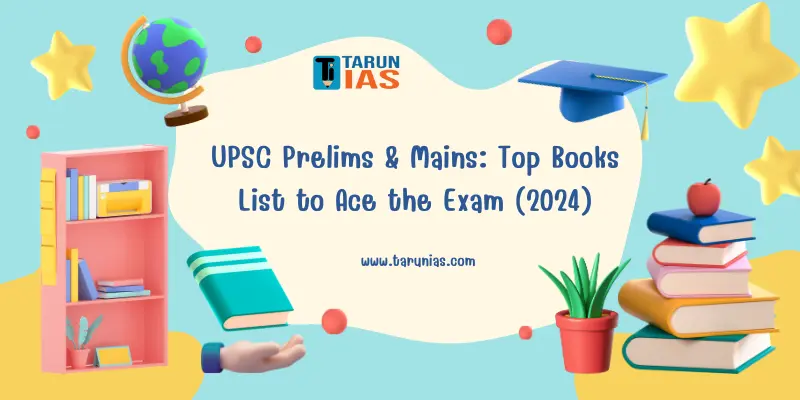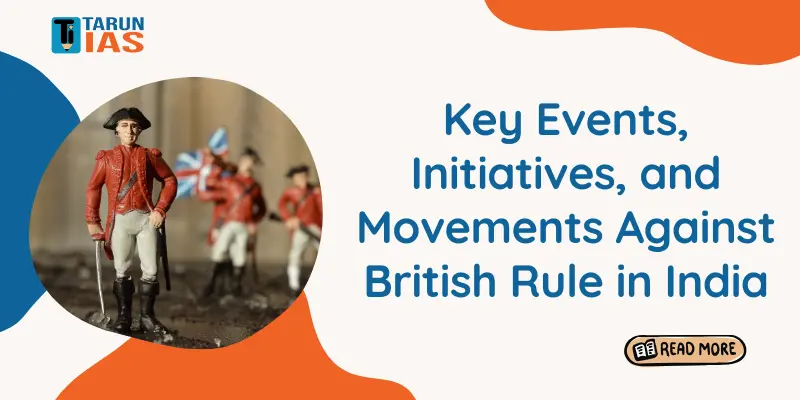Best Books for UPSC IAS Prelims and Mains Exam
The UPSC Civil Services Examination (CSE) is one of the most prestigious and competitive exams in India. It serves as a gateway to a career in the Indian Administrative Service (IAS), Indian Police Service (IPS), Indian Foreign Service (IFS), and several other Group A services.
Preparing for the UPSC Civil Services Exam may seem like a formidable challenge at first glance. However, with a methodical approach, unwavering dedication, and careful strategic planning, aspiring candidates can turn their goal of becoming a civil servant into a reality.
This article gives you a detailed UPSC preparation strategyand book list for Prelims and Mains examination. The book list is compiled after thorough discussion with Tarun IAS faculties, selected candidates from Tarun IAS and the UPSC book list recommended by toppers after going through hundreds of such interviews.
Book List for UPSC IAS Prelims Exam
Indian Polity book list for UPSC
The book list for Indian Polity for UPSC IAS Prelims Exam and how to prepare Indian Polity for UPSC IAS Prelims Exam:
- Indian Polity constitutes a significant portion of both the Preliminary GS Paper 1 and Main Examination GS Paper 2 of the UPSC CSE.
- The first step in starting the preparation of Indian Polity is the book on “Indian Polity by M. Laxmikant.”
- You should start from easy and exciting chapters like President, Vice-President, Parliament…followed by chapters like Preamble, Fundamental Rights, Directive Principles, Fundamental Duties…Supreme Court and High Courts etc. These chapters will form your foundation in the subject of Polity and also create an interest in the subject.
- You should also combine chapters like President-Governor, Prime Minister-Chief Minister, Parliament-State Legislature etc. This way you would not only be able to compare these topics but also be able to finish more chapters in lesser time.
- This should be followed by chapters on Constitutional and Statutory Bodies like Election Commission, Finance Commission, Comptroller and Auditor General of India etc.
- Again, here also, you should read chapters like Comptroller and Auditor General of India with Attorney General of India, Union Public Service Commission with State Service Commissions etc.
- Then you can read the remaining chapters covering diverse aspects of Indian polity.
- UPSC uses diverse resources for creating questions. The above book on Indian Polity should be supplemented by “NCERTs: Political Theory and Indian Constitution at Work from class 11.”
History book list for UPSC
The book list for History for UPSC IAS Prelims Exam and how to prepare History for UPSC IAS Prelims Exam:
- Modern History constitutes a significant portion of both the Preliminary GS Paper 1 and Main Examination GS Paper 1 of the UPSC CSE.
- In Prelims exam, the maximum questions are generally asked from the Modern India. So you should start your preparation for history from Modern India.
- For Modern India, you should start from “Modern India by Spectrum Publications.” It is a bit bulky book but it will also help you in both Prelims and Mains examination.
- Though comparatively a lesser number of questions are asked in Prelims from Ancient and Medieval India but still they are very important part of your UPSC preparation.
- For ancient India, you should read “Ancient India by R.S. Sharma” and for medieval India, the best book start with is “Medieval India by Satish Chandra.” They were earlier published by NCERTs (also famously called old NCERTs), now available in the market under other publications but the content is still the same.
- However, even these books are not enough and many questions are asked outside of these books. To cover such questions, it is suggested to supplement the above books with “Ancient and Medieval India by Poonam Dalal Dahiya.”
Art and Culture book list for UPSC
The book list for Art and Culture for UPSC IAS Prelims Exam and how to prepare History for UPSC IAS Prelims Exam:
- Art and Culture constitute a significant portion of both the Preliminary GS Paper 1 and Main Examination GS Paper 1 of the UPSC CSE.
- The book “Art and Culture by Nitin Singhania” is the single most important resource for the civil service examination.
- After covering the above book, you can supplement your readings with NCERT textbook, “An Introduction to Indian Art – Part 1 & 2 (Class 11).”
Geography book list for UPSC
The book list for Geography for UPSC IAS Prelims Exam and how to prepare History for UPSC IAS Prelims Exam:
- Geography covers a significant portion of both the Preliminary GS Paper 1 and Main Examination GS Paper 1 of the UPSC CSE.
- You should start your geography preparation with NCERT geography textbooks, namely “The Earth: Our Habitat (Class 6), “Fundamentals of Physical Geography (Class 11)”, followed by, “India: Physical Environment (Class 11)” for the basics.
- Though, significantly lesser number of questions are asked from “human Geography” but still you need to prepare these subjects from NCERT geography textbooks, namely “Fundamentals of Human Geography (Class 12)”, followed by, “India – People and Economy (Class 12).”
- The above books should be supplemented by “Certificate Physical and Human Geography by Goh Cheng Leong” to thoroughly prepare geography for the civil service exam.
- You should also develop the habit of locating places you read about in textbooks and newspapers on map. For this, a good atlas like “Oxford School Atlas” will be quite handy.
Economics book list for UPSC
The book list for Economics for UPSC IAS Prelims Exam and how to prepare History for UPSC IAS Prelims Exam:
- Economics constitutes a significant portion of both the Preliminary GS Paper 1 and Main Examination GS Paper 3 of the UPSC CSE.
- The most important resource to cover economy for UPSC is “Indian Economy by Nitin Singhania.”
- Start with easier and interesting topics like GDP, Inflation, Monetary Policy, Capital Market, World Institutions etc. which will also be helpful in understanding economy related news and then slowly move on to other topics.
- The above basic textbook in economics must be supplemented by “Economic Survey” released every year in the last week of February.
Agriculture, Environment and Ecology book list for UPSC
The book list for Agriculture, Environment and Ecology for UPSC IAS Prelims Exam and how to prepare History for UPSC IAS Prelims Exam:
- Environment and Ecology constitute a significant portion of both the Preliminary GS Paper 1 and Main Examination GS Paper 3 of the UPSC CSE.
- The importance of this subject has significantly increased since the use of civil service prelims examination for qualifying to the Mains examination of the Indian Forest Service exam.
- The most widely recommended book to cover these portions is “Environment and Ecology by Shankar IAS.”
- Besides, you should also cover selected chapters of “NCERT Biology (Class 12)” book.
- “Down to Earth” and “Mongabay” are also good websites to get a lot of relevant information on current aspects of these subjects.
Science and Technology book list for UPSC
The book list for Science and Technology for UPSC IAS Prelims Exam and how to prepare History for UPSC IAS Prelims Exam:
- Science and Technology constitute a significant portion of both the Preliminary GS Paper 1 and Main Examination GS Paper 3 of the UPSC CSE.
- Though most of the questions asked from Science and Technology these days are from the current events, still “NCERT textbooks for Science (classes 6-10)” are necessary to form a solid foundation in these subjects.
- Besides, you should also cover selected chapters of “NCERT Physics, Chemistry and Biology (Class 12)” books.
Current Affairs book list for UPSC
The sources for current affairs for UPSC IAS Prelims Exam and how to prepare History for UPSC IAS Prelims Exam:
- Current Affairs cover a significant portion of both the Preliminary GS Paper 1 and Main Examination GS Paper 1, 2, 3 and 4 of the UPSC CSE.
- You should read one national newspaper daily to get a general overview of what is happening in the society. You can read either “The Hindu” or “Indian Express” for this.
- However, it is quite time consuming to make notes from the newspaper daily. The “current affairs by Tarun IAS” are the most exhaustive yet to-the-point notes prepared by a team of subject-matter experts.
Most common mistakes we should avoid in UPSC Prelims Preparation
- You should start your preparation at least a year before the UPSC Prelims exam.
- Even before starting reading books, you should go through the syllabus of both the Prelims and Mains exams thoroughly.
- You must solve subject-wise questions on all of the above topics already asked in the previous year papers by UPSC and solve them regularly after completing the chapters covering those topics. This will help you to understand the type of questions asked, the level of difficulty and also if you are using the right resources in your preparation.
- Join a Test Series. It will help you learn about your strengths and weaknesses. Tarun IAS provides one of the most sought-after test series for UPSC for prelims exam.
- Supplement your static subjects with relevant articles from current affairs appearing in the news papers.
- Regularly follow government websites like PIB or you can also download Tarun IAS current affairs under which we also cover PIB summary and short notes.
- To avoid wasting time, you should set a timeline of objectives to be achieved, both long-term and daily.
- You should revise regularly the content you have been reading at least on a weekly basis.
- You can also form discussion/answer writing groups consisting of serious students to help each other.
Book List for UPSC IAS Mains Exam
- While the Preliminary Examination consists of objective-type questions aimed at testing a candidate’s factual knowledge and understanding of various subjects, the Main Examination involves descriptive papers where candidates are required to express their understanding and analysis of topics through essays, answers, and arguments.
- Though, the Prelims syllabus is broad and covers a wide range of subjects, the depth of knowledge required is relatively shallow. On the other hand, Mains syllabus delves deeper into the subjects covered in Prelims. It includes detailed understanding, critical analysis, and application of knowledge across various disciplines.
- Notes making is very important for Mains exam preparation. You should divide the whole syllabus of Mains into smaller parts and dedicate separate notebooks for them. While reading newspaper, magazines, books or websites, you should make short notes under various headings and keep updating your notes with whatever new information you collect. But you should note that Mains notes should be very brief and should be compiled in the form of ‘phrases’ rather than grammatically-correct sentences otherwise soon they will become very bulky and unmanageable. We at Tarun IAS are covering Mains related articles separately on our website in a very comprehensive manner.
- Mains examination is all about writing practice. You should develop enough speed to complete your paper in the given time in a proper legible writing style. Tarun IAS can help you in achieving this. We not only prepare our students as how to write quickly by our team of experts but also by asking UPSC standard questions we prepare them in advance as how to face and write answers to seemingly unexpected, out-of-the-syllabus type questions with the help of key phrases and ready-made lines to be used in different parts of your answer.
- Some of the books and other resources which will help you in your Mains preparation are:
- The Story of Civilization by Arjun Dev (Class 10, Old NCERT Book)
- Contemporary World History (Class 12, Old NCERT Book)
- Mastering Modern World History by Norman Lowe
- Lexicon by Chronicle Publications for GS Mains Paper 4 (Ethics paper)
- One national newspaper: The Hindu or Indian Express
- Ethics in Governance, 2nd ARC Report
- Selected articles from Yojana Magazine
- Tarun IAS Current Affairs Magazine
- Tarun IAS Mains Article Series





